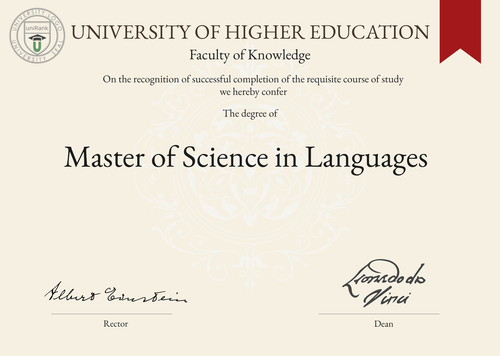
Master of Science in Languages (MSc in Languages)
Guide to Master of Science in Languages Program/Course/Degree
Master of Science in Languages (MSc in Languages)

Program Name:
Master of Science in LanguagesProgram or Degree abbreviation:
MSc in LanguagesDuration range:
The duration of the program typically ranges from 1 to 2 years, depending on the university and country.Tuition range:
Tuition fees for the program vary depending on the chosen country and university. The range can vary significantly.Overview:
The Master of Science in Languages program is designed to provide students with advanced knowledge and skills in various languages. It focuses on linguistic theories, language acquisition, translation, interpretation and cultural studies. The program aims to enhance students' language proficiency and cultural understanding, preparing them for careers in fields such as education, translation, interpretation, international relations and more.Curriculum Overview by year:
The curriculum of the program is structured to cover a wide range of language-related subjects. The specific courses may vary depending on the university, but typically include: Year 1: - Linguistic Theories - Language Acquisition - Translation and Interpretation Techniques - Cultural Studies - Elective Courses Year 2: - Advanced Language Studies - Specialized Translation and Interpretation - Research Methods - Thesis or Capstone ProjectKey Components:
The key components of the Master of Science in Languages program include: - In-depth study of linguistic theories and language acquisition - Practical training in translation and interpretation techniques - Cultural studies to enhance cross-cultural understanding - Research methods and the opportunity to conduct independent research - Specialized courses to develop expertise in specific languages or areas of studyCareer Prospects:
Graduates of the program can pursue various career paths, including: - Language teachers or professors - Translators and interpreters - Language consultants - International relations specialists - Cross-cultural trainers - Localization specialists - Language program coordinatorsSalary Expectations:
Salary expectations for graduates of the Master of Science in Languages program can vary depending on factors such as the chosen country, industry and level of experience. Generally, language professionals can earn competitive salaries, with higher salaries often associated with specialized expertise and experience. For a more accurate understanding of salary expectations, you can utilize the Job Sites Search Engine, from our sister site jobRank, which searches over 4,600 job sites worldwide. Make sure to specify not only the job title but also the country you are interested in.Conclusions:
It is important to note that the duration, tuition fees, curriculum, key components, career prospects and salary expectations of the Master of Science in Languages program can vary depending on the chosen country or location of study, as well as the specific university. Prospective students are advised to research and compare different universities and countries to find the program that best suits their needs and goals. Visitors can search for where this specific degree, MSc in Languages, is offered anywhere in the world through the uniRank World Universities Search Engine.World Universities Search Engine
search for Master of Science in Languages (MSc in Languages) and add the Location (country, state etc.) or specific University you are interested in studying at.
Query examples:
- Master of Science in Languages (MSc in Languages) United States
- Master of Science in Languages (MSc in Languages) United Kingdom online
- Master of Science in Languages (MSc in Languages) Australia international students
- Master of Science in Languages (MSc in Languages) University of California
- Master of Science in Languages (MSc in Languages) University of London tuition fees
- Master of Science in Languages (MSc in Languages) University of Sydney scholarships
Share Program/Course
Interesting? Share this program/course/degree info with your friends now.